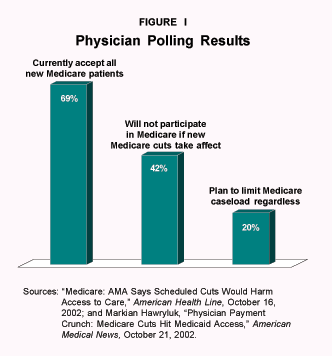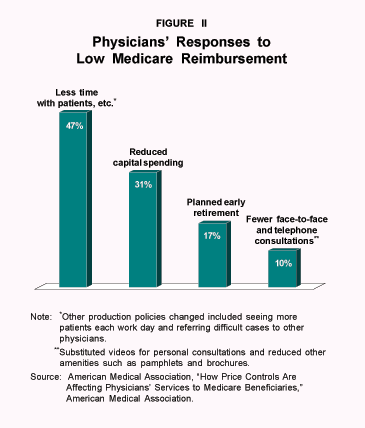The fees Medicare pays physicians who treat seniors are not determined in the marketplace. Instead, they are arbitrarily set by the Centers for Medicare and Medicaid Services (CMS), based on a complex formula implemented in 1992. The fees are updated yearly and are subject to political pressures to hold down total expenditures. For example, Congress in the Balanced Budget Act (BBA) of 1997 directed CMS to reduce physicians' fees by a total of $11.7 billion by 2007. CMS cut physicians' Medicare payments 5.4 percent in 2002 and anticipates additional cuts of 12 percent by 2005.
Moreover, mandated cuts in specific specialties are arbitrary. For example, fees for cardiac surgeons were reduced by 14 percent and payments to thoracic surgeons by 10 percent between 1997 and 2001. Not surprisingly, the number of surgeons who accepted all new Medicare patients fell 10.4 percent over the same period. 
Studies by the American Medical Association (AMA) and the Center for Studying Health System Change (HSC) suggest that further cuts might impede access to doctors and reduce the quality of seniors' care.
Fewer Physicians Available.
According to a survey by the AMA, many physicians already limit seniors' access to their services. [See Figure I.]
Almost 30 percent of physicians limit the number of new Medicare patients they will accept – or do not accept Medicare patients at all.
- The proportion of physicians who accept all new Medicare patients fell 9.2 percent from 1999 to 2002; only 69 percent now accept all comers.
These problems will become much worse if payments are cut further. According to the AMA survey:
- Twenty percent of physicians report that they have limited or plan to limit their Medicare caseload.
- Forty-two percent report they will not participate in Medicare if planned fee cuts take place.
By 2005, Medicare patients may have access to just over half of all physicians, and some of those willing to treat Medicare patients may not accept new patients.
Longer Waits.
Reduced access also means that Medicare patients must wait longer to receive services. Many seniors surveyed by HSC reported delays in receiving care.
- In 2001, more than one-third (37.1 percent) of seniors waited more than three weeks for an appointment for a checkup – 15 percent more than reported delays in 1997.
- In 2001, 40.3 percent of seniors waited more than one week for an appointment for treatment of a specific illness – up 16 percent from 1997.
These perverse incentives discourage states from providing better services to the unemployed.
Less Time with the Doctor.
Low physician reimbursement rates may also reduce the quality of medical services seniors receive. For instance, the AMA found that physicians in general have reduced the time they spend with each patient. Nationally, approximately two-thirds of physicians surveyed (65.2 percent) either spend less time with patients during a visit or squeeze more visits into each workday. Many are also referring difficult cases to other physicians or specialists rather than caring for the patients themselves. None of these actions are in patients' best interest.
Compared to doctors with few Medicare patients, physicians who reported that Medicare beneficiaries were a significant portion of their practice were more apt to spend less time with patients. Nearly three-fourths said Medicare reimbursement rates were the reason. Many physicians also reported substituting videos or other impersonal approaches for face-to-face patient counseling.
Less Access to Technology.
Low reimbursement rates may also reduce quality of care by discouraging physicians from investing in their practices. Doctors may delay replacing aging equipment; they may not purchase new technology; they may send patients to a hospital for procedures they once performed in-house. [See Figure II.] The AMA survey found:
- In all, 38.3 percent of doctors have delayed purchasing new equipment while close to half of surgeons (47.4) have delayed capital equipment purchases.
- Low Medicare fees were cited as the reason by 80.4 percent of physicians and 83.5 percent of surgeons.
Fewer Physicians Practicing.
One of the best indicators of physicians' dissatisfaction with fee-for-service prices is the number leaving the profession. Once trained, few physicians can afford to change professions. But many plan to retire early rather than continue practicing. For example, almost 28 percent of physicians surveyed by the AMA were planning to retire early. Of those, 62 percent gave reductions in Medicare payments as the reason. By this measure, almost one in five physicians is contemplating retirement as a response to cuts in Medicare payments.
Distorted incentives
Distorted incentives are pervasive wherever Medicare sets arbitrary reimbursement fees. For example, under a fixed-payment system (which is the main way Medicare pays hospitals), the staff has an incentive to underprovide services because they get the same amount of income regardless of how much or how little they do. By contrast, under fee-for-service reimbursement (which is the way Medicare pays doctors), physicians have an incentive to overprovide services because the more they do the more they earn. To keep providers from acting on these incentives, Medicare imposes a sea of regulations, enforced by an army of bureaucrats.
Conclusion.
The lesson in this complex of problems is not that government should pay higher physician fees to Medicare providers. Rather, it is that patients should be able to pay market rates for physician services. Some physicians may charge higher fees for greater skills or extra services provided. Some patients may choose to pay higher fees for desired amenities. Government price fixing is no solution to the health care needs of the elderly.
Devon Herrick is manager of research at the National Center for Policy Analysis.